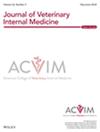Effects of Paricalcitol on Renal Secondary Hyperparathyroidism and Proteinuria in Dogs With Chronic Kidney Disease
Abstract
Background
Renal secondary hyperparathyroidism (RHPT) is an inevitable consequence of chronic kidney disease (CKD). Paricalcitol might safely attenuate RHPT and proteinuria.
Hypothesis/Objective
Paricalcitol decreases parathyroid hormone (PTH) and proteinuria in dogs with CKD.
Animals
Thirteen dogs with naturally acquired CKD.
Methods
Placebo-controlled clinical trial. Dogs were randomly allocated to receive a placebo or paricalcitol (14 ng/kg/day) in a crossover design of 2, 12-week arms. Dogs were evaluated every 3 weeks. Associations between treatment, visit, and the outcome variables were assessed using generalized estimating equations.
Results
PTH decreased by 22% (95% CI, 7%–35%, p = 0.006) in the paricalcitol-treated dogs and increased by 18% (95% CI, 2%–37%, p = 0.022) in the placebo-treated dogs with each visit. FGF-23 at 12 weeks increased compared with baseline in the paricalcitol-treated (mean 6941 pg/mL, 95% CI, 1781–20 057 vs. 489 pg/mL, 95% CI, 188–1272, p < 0.001, respectively), but not in the placebo-treated dogs (696 pg/mL, 95% CI, 316–1531 vs. 955 pg/mL, 95% CI, 308–2963, p = 0.529). Urine protein-to-creatinine ratio at 12 weeks increased compared with baseline in the placebo-treated (0.8, 95% CI, 0.3–1.3 vs. 0.5, 95% CI, 0.2–0.9, p = 0.04, respectively), but not in the paricalcitol-treated dogs (0.6, 95% CI, 0.3–0.9 vs. 1.0, 95% CI, 0.1–1.8, p = 0.35). Ionized calcium was unchanged between baseline and 12 weeks in the paricalcitol- and placebo-treated groups (1.3 mmol/L, 95% CI, 1.29–1.35 and 1.34, 95% CI, 1.27–1.40 vs. 1.30, 95% CI, 1.25–1.35, p = 0.12 and 1.28, 95% CI, 1.24–1.32, p = 0.034, respectively). However, 7/13 dogs developed mild hypercalcemia. Adverse effects were not reported by the owners.
Conclusion and Clinical Importance
Paricalcitol attenuated RHPT and stabilized renal proteinuria in dogs with CKD.


 求助内容:
求助内容: 应助结果提醒方式:
应助结果提醒方式:


